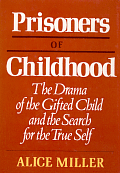Prisoners of Childhood
in the UK, “The Drama of Being a Child”
Basic Books, 1981

The common bond unifying the three studies in this volume is a concern with the factors operative in loss of the self and the routes leading towards the achievement of true identity. “The Drama of the Gifted Child” (and “gifted” here means “sensitive”, “aware”) has its roots in an intuitive apprehension of the parents’ needs by the child at a very early stage. The child adapts to those needs by learning not to feel its most intense feelings, once it has realized that those feelings are considered undesirable. Although these “prohibited” feelings cannot always be avoided at a later stage, they remain split off; this means that the most vital part of the true self is not integrated into the personality. The result is emotional insecurity and impoverishment (loss of self), either expressed in the form of depression or fended off via grandiosity. The examples cited sensitize us to the mute, inarticulate suffering of the child and help us to penetrate the idealizations serving to conceal that suffering. It also opens our eyes to the tragedy of the parents; their unavailability and inaccessibility prove to be the fruit of their availability as children.
- From Rage to Courage
- Free From Lies
- The Body Never Lies
- The Truth Will Set You Free
- Paths of Life – Seven Scenarios
- Breaking Down the Wall of Silence
- The Drama of the Gifted Child
- Banished Knowledge
- The Untouched Key
- Pictures of a Childhood
- Thou Shalt Not Be Aware
- For Your Own Good
- Prisoners of Childhood

